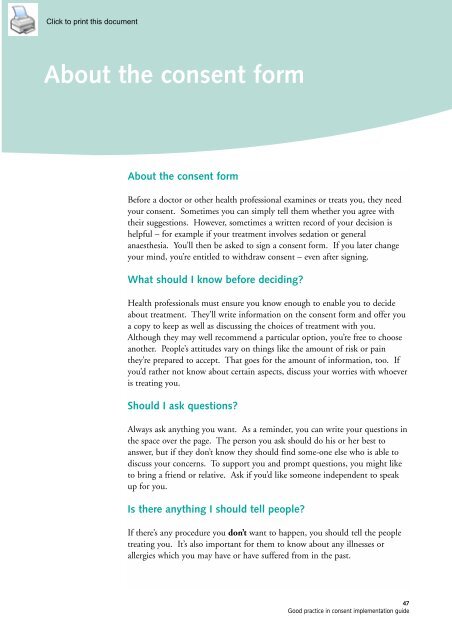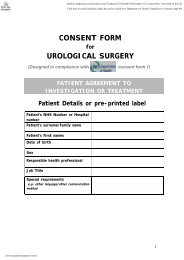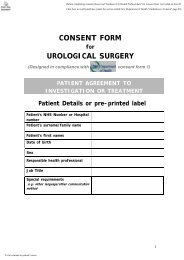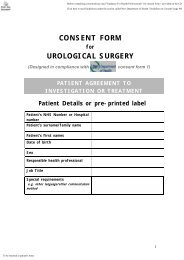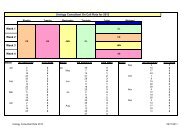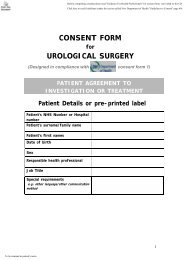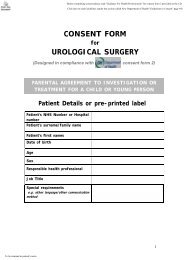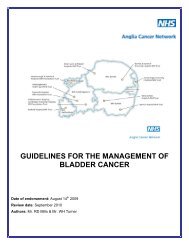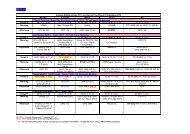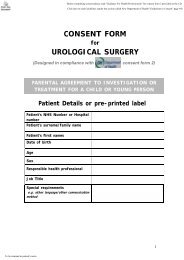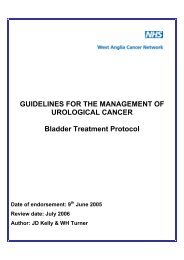parent consent form - Pchurology.co.uk
parent consent form - Pchurology.co.uk
parent consent form - Pchurology.co.uk
You also want an ePaper? Increase the reach of your titles
YUMPU automatically turns print PDFs into web optimized ePapers that Google loves.
About the <strong><strong>co</strong>nsent</strong> <strong>form</strong><br />
About the <strong><strong>co</strong>nsent</strong> <strong>form</strong><br />
Before a doctor or other health professional examines or treats you, they need<br />
your <strong><strong>co</strong>nsent</strong>. Sometimes you can simply tell them whether you agree with<br />
their suggestions. However, sometimes a written re<strong>co</strong>rd of your decision is<br />
helpful – for example if your treatment involves sedation or general<br />
anaesthesia. You’ll then be asked to sign a <strong><strong>co</strong>nsent</strong> <strong>form</strong>. If you later change<br />
your mind, you’re entitled to withdraw <strong><strong>co</strong>nsent</strong> – even after signing.<br />
What should I know before deciding?<br />
Health professionals must ensure you know enough to enable you to decide<br />
about treatment. They’ll write in<strong>form</strong>ation on the <strong><strong>co</strong>nsent</strong> <strong>form</strong> and offer you<br />
a <strong>co</strong>py to keep as well as discussing the choices of treatment with you.<br />
Although they may well re<strong>co</strong>mmend a particular option, you’re free to choose<br />
another. People’s attitudes vary on things like the amount of risk or pain<br />
they’re prepared to accept. That goes for the amount of in<strong>form</strong>ation, too. If<br />
you’d rather not know about certain aspects, discuss your worries with whoever<br />
is treating you.<br />
Should I ask questions?<br />
Always ask anything you want. As a reminder, you can write your questions in<br />
the space over the page. The person you ask should do his or her best to<br />
answer, but if they don’t know they should find some-one else who is able to<br />
discuss your <strong>co</strong>ncerns. To support you and prompt questions, you might like<br />
to bring a friend or relative. Ask if you’d like someone independent to speak<br />
up for you.<br />
Is there anything I should tell people?<br />
If there’s any procedure you don’t want to happen, you should tell the people<br />
treating you. It’s also important for them to know about any illnesses or<br />
allergies which you may have or have suffered from in the past.<br />
47<br />
Good practice in <strong><strong>co</strong>nsent</strong> implementation guide
About the <strong><strong>co</strong>nsent</strong> <strong>form</strong><br />
Can I find out more about giving <strong><strong>co</strong>nsent</strong>?<br />
The Department of Health leaflet Consent – what you have a right to expect is a<br />
detailed guide on <strong><strong>co</strong>nsent</strong> in versions for adults, children, <strong>parent</strong>s,<br />
carers/relatives and people with learning disabilities. Ask for one from your<br />
clinic or hospital, order one from the NHS Responseline (08701 555 455) or<br />
read it on the web site www.doh.gov.<strong>uk</strong>/<strong><strong>co</strong>nsent</strong>.<br />
Who is treating me?<br />
Amongst the health professionals treating you may be a “doctor in training” –<br />
medically qualified, but now doing more specialist training. They range from<br />
recently qualified doctors to doctors almost ready to be <strong>co</strong>nsultants. They will<br />
only carry out procedures for which they have been appropriately trained.<br />
Someone senior will supervise – either in person ac<strong>co</strong>mpanying a less<br />
experienced doctor in training or available to advise someone more<br />
experienced.<br />
What about anaesthesia?<br />
If your treatment involves general or regional anaesthesia (where more than a<br />
small part of your body is being anaesthetised), you’ll be given general<br />
in<strong>form</strong>ation about it in advance. You’ll also have an opportunity to talk with<br />
the anaesthetist when he or she assesses your state of health shortly before<br />
treatment. Hospitals sometimes have pre-assessment clinics which provide<br />
patients with the chance to discuss things a few weeks earlier.<br />
Will samples be taken?<br />
Some kinds of operation involve removing a part of the body (such as a gall<br />
bladder or a tooth). You would always be told about this in advance. Other<br />
operations may mean taking samples as part of your care. These samples may<br />
be of blood or small sections of tissue, for example of an unexplained lump.<br />
Such samples may be further checked by other health professionals to ensure<br />
the best possible standards. Again, you should be told in advance if samples<br />
are likely to be taken.<br />
Sometimes samples taken during operations may also be used for teaching,<br />
research or public health monitoring in the future interests of all NHS<br />
patients. The NHS trust treating you will have a local system for checking<br />
whether you’re willing for this to happen.<br />
48<br />
Good practice in <strong><strong>co</strong>nsent</strong> implementation guide
About the <strong><strong>co</strong>nsent</strong> <strong>form</strong><br />
Photographs and videos<br />
As part of your treatment some kind of photographic re<strong>co</strong>rd may be made –<br />
for example X-rays, clinical photographs or sometimes a video. You will always<br />
be told if this is going to happen. The photograph or re<strong>co</strong>rding will be kept<br />
with your notes and will be held in <strong>co</strong>nfidence as part of your medical re<strong>co</strong>rd.<br />
This means that it will normally be seen only by those involved in providing<br />
you with care or those who need to check the quality of care you have<br />
received. The use of photographs and re<strong>co</strong>rdings is also extremely important<br />
for other NHS work, such as teaching or medical research. However, we will<br />
not use yours in a way that might allow you to be identified or re<strong>co</strong>gnised<br />
without your express permission.<br />
What if things don’t go as expected?<br />
Amongst the 25,000 operations taking place every day, sometimes things don’t<br />
go as they should. Although the doctor involved should in<strong>form</strong> you and your<br />
family, often the patient is the first to notice something amiss. If you’re<br />
worried – for example about the after-effects of an operation <strong>co</strong>ntinuing much<br />
longer than you were told to expect – tell a health professional right away.<br />
Speak to your GP, or <strong>co</strong>ntact your clinic - the phone number should be on<br />
your appointment card, letter or <strong><strong>co</strong>nsent</strong> <strong>form</strong> <strong>co</strong>py.<br />
What are the key things to remember?<br />
It’s your decision! It’s up to you to choose whether or not to <strong><strong>co</strong>nsent</strong> to what’s<br />
being proposed. Ask as many questions as you like, and remember to tell the<br />
team about anything that <strong>co</strong>ncerns you or about any medication, allergies or<br />
past history which might affect your general health.<br />
49<br />
Good practice in <strong><strong>co</strong>nsent</strong> implementation guide
About the <strong><strong>co</strong>nsent</strong> <strong>form</strong><br />
Questions to ask health professionals<br />
As well as giving you in<strong>form</strong>ation health professionals must listen and do their<br />
best to answer your questions. Before your next appointment, you can write<br />
some down in the space below.<br />
Questions may be about the treatment itself, for example:<br />
• What are the main treatment options?<br />
• What are the benefits of each of the options?<br />
• What are the risks, if any, of each option?<br />
• What are the success rates for different options – nationally, for this unit<br />
or for you (the surgeon)?<br />
• Why do you think an operation (if suggested) is necessary?<br />
• What are the risks if I decide to do nothing for the time being?<br />
• How can I expect to feel after the procedure?<br />
• When am I likely to be able to get back to work?<br />
Questions may also be about how the treatment might affect your future state<br />
of health or style of life, for example:<br />
• Will I need long-term care?<br />
• Will my mobility be affected?<br />
• Will I still be able to drive?<br />
• Will it affect the kind of work I do?<br />
• Will it affect my personal/sexual relationships?<br />
• Will I be able to take part in my favourite sport/exercises?<br />
• Will I be able to follow my usual diet?<br />
Health care professionals should wel<strong>co</strong>me your views and discuss any issues so<br />
they can work in partnership with you for the best out<strong>co</strong>me.<br />
50<br />
Good practice in <strong><strong>co</strong>nsent</strong> implementation guide
If you require further FREE <strong>co</strong>pies of this publication<br />
please <strong>co</strong>ntact:<br />
Department of Health Publications<br />
PO Box 777<br />
London SE1 6XH<br />
Fax: 01623 724524<br />
E-mail doh@prolog.<strong>uk</strong>.<strong>co</strong>m<br />
Please quote reference 25751 when ordering.<br />
It is also available on our website at:<br />
www.doh.gov.<strong>uk</strong>/<strong><strong>co</strong>nsent</strong><br />
This publication can also be made available in braille, by email, or in<br />
large print, on request.<br />
The text of this document may be reproduced without <strong>form</strong>al<br />
permission or charge for personal or in-house use.<br />
First Published: November 2001<br />
© Crown Copyright<br />
Produced by the Department of Health<br />
25751 1p 10k Nov 01 (BEL)<br />
CHLORINE FREE PAPER


